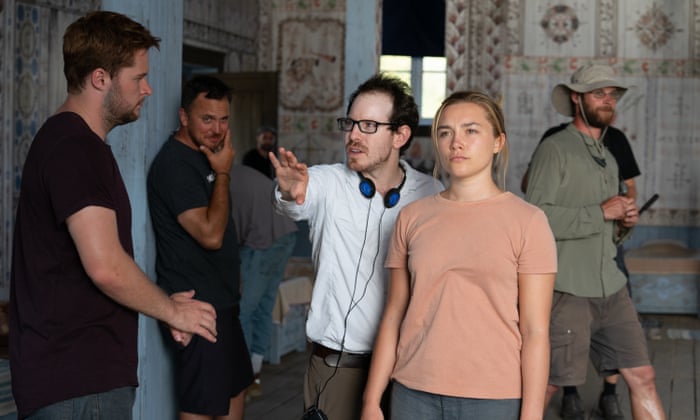Ari Aster: The mind behind “Hereditary” and “Midsommar”
With the announcement of Joaquin Phoenix starring in Aster’s next film, take a look at his early shorts.
Horror is a very subjective film genre. Different people are scared of different things during different periods of time. However, one thing that many horror fans can agree on is that the biggest names in horror right are Robert Eggers, Jordan Peele and most notably, Ari Aster.
To create such mesmerizingly frightening and disturbing movies, Aster has his own definition of what he finds to be truly disturbing. He even stated that Stanley Kubrick’s “The Shining” is a comedy.
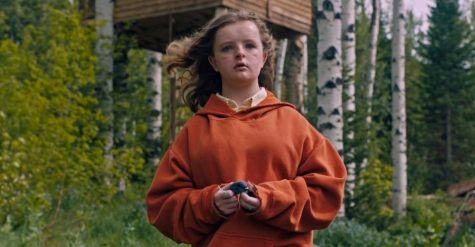
Aster is most known for his surprise hit “Hereditary,” released in 2018, is considered to be one of the best horror movies of the 2010s. What was most notable about “Hereditary” was its take on being a horrific family drama. “Hereditary” starts with the aftermath of a grandmother dying and the grief process that follows. There is an abundance of twists and turns present and I would never have predicted its ending after watching its beginning. Each family member acts in such a way that is both astounding and horrifying and it felt as if Aster put me into each scene. Controversially, actress Toni Collette did not receive an Oscar despite being heavily praised by audiences for her performance as the mother. Collette’s monologue is a highlight within the presented two hours and is horrifying in its own right. Realistic anger and frustration emerge from this monologue and what’s even more amazing is that she seemed down and hopeless in the previous scene. Her quick shifts in acting make her stand out. Aside from being so horrifying that I wasn’t able to sleep that night, it is very unapproachable due to how complex and detailed its lore is. Cult activity is explored upon to an extensive amount. I paid close attention while watching this movie for initially and I was still left confused until I did my research afterward. If you do enjoy this film, a second watch is necessary. There are so many easter eggs and bits of foreshadowing that no one could have picked up on their first watch. The acting is phenomenal, especially Collette’s performance. Each member of the family goes through traumatic experiences and their portrayals are all as real as they come. In one scene, when the family witnesses another important death, Collette doesn’t cry, she screams with tears and it is just haunting. I would consider the family drama aspect of this movie to be the most horrifyingly surreal detail to this movie because of how realistic it is and that’s saying a lot considering the abundance of disturbing visuals. Alex Wolff who plays the son even stated that he felt both physically and mentally sick after filming “Hereditary.” If you’re a horror fan that somehow still hasn’t seen “Hereditary,” you need to do so this instant.
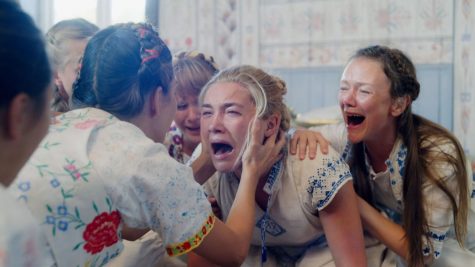
A year later, Aster’s “Midsommar” was released, a horror movie in a different vein to “Hereditary.” In this controversial film, the audience follows a group of young adults, including a dysfunctional couple, as they venture to a Swedish village to experience a midsummer festival only to realize that they are being accommodated by a bizarre cult. “Hereditary” had elements of a horrific family drama, but Aster states that “Midsommar” is a folk horror breakup movie with the trajectory of a high school comedy. It is a comedic movie, but it has the darkest sense of humor imaginable and oftentimes, I found myself unsure of whether or not I was supposed to laugh at certain scenes. This demented sense of humor is what makes me really appreciate this movie, especially with Aster’s weird description of it. However, there are a plethora of things I don’t like about it. “Midsommar” is predictable. You would be able to tell the movie’s endgame just by looking at one trailer. After watching “Hereditary” before this which had multiple twists, I was very disappointed. Because of how predictable it is, Aster could have cut its two-and-a-half-hour runtime by an hour and it would still have the same effect. It dragged on far too long for what it is. That being said, I did enjoy some of the beautiful visuals of the Swedish village in its ironically happy lighting. It was a good way to take a break from seeing some disturbing images. If you want deranged cult sceneries masked by beautiful flowery landscapes of Sweden, this would be a movie to watch, but don’t expect another “Hereditary.”
Aster’s third movie, “Disappointment Blvd.,” is currently in pre-production and will star Joaquin Phoenix who received an Oscar for his portrayal in “Joker,” pre-pandemic.
Both “Hereditary” and “Midsommar” have given value to Aster’s name in Hollywood which made me wonder how he started off as a filmmaker. Several of Aster’s short films made a decade ago are available to watch online for free. Exploring the unknown is a theme debated amongst students. In this case, maybe I shouldn’t have explored deep into Aster’s early filmography for the sake of my own sanity.
“The Strange Thing About the Johnson’s” (2011)
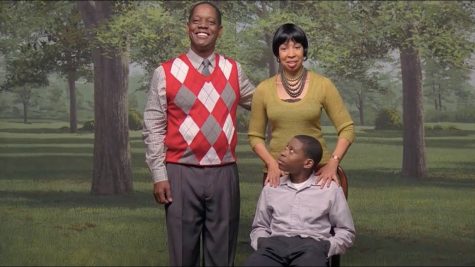
Synopsis: The Johnson family grapples with incestual abuse between the father and son that has taken place for years.
Downright disturbing, creepy, and terrifying don’t even begin to describe my feelings about Aster’s short film debut. Despite only being 30 minutes long, I was constantly left unnerved by what was presented to me. This is a family drama similar to “Hereditary,” but instead of outlining a dysfunctional family’s grievances, this short film outlines a dysfunctional family’s incestual abuse. “The Strange Thing About the Johnson’s” is not a horror movie, but it is one of the most horrific things conceptualized onto a script. It’s as hard to write about this short film as it is to watch it mainly because it touches upon incestual abuse which I had never before seen in any screenplay that I have ever seen. It’s a tragic story and it is upheld by interactions between father and son. Both of their actors do a great job for what their role is, especially since I felt uncomfortable with them being in scenes with one another. According to Aster, this short film was conceptualized by challenging himself to show the unshowable to an audience. If that was his goal, he achieved it, because I felt extremely uncomfortable sitting through this one.
“TDF Really Works” (2011)
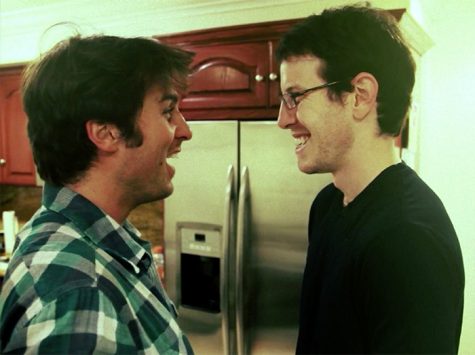
Synopsis: A fake infomercial for an absurd fake product that stops odd flatulence.
At a certain point, I came to realize that all infomercials have the exact same mood and production value. If you saw this infomercial during a commercial break, you would probably think that this is a promotion for a real product. However, you would realize that isn’t real as soon as a crude image of “TDF” appears on-screen. Watching this was a weird three minutes of my life that I’ll never get back or forget. Aster’s bizarre sense of humor is exemplified in this short film with vulgar phallic jokes and visuals that just made me think to myself “what am I watching?” I genuinely forgot that the person that made “TDF Really Works” also made the same movie that kept me up at night. “TDF Really Works” may have kept me up at night as well, but for completely different reasons. In fact, I share this short film with my friends and reveal to them that Aster directed it afterward and their reactions are always priceless. Overall, I do find this short film to be an amusing commentary on how ridiculous some real infomercials can be. If you’ve heard one phallic joke before in your life, you’ve heard every joke in this three-minute short.
“Beau” (2011)
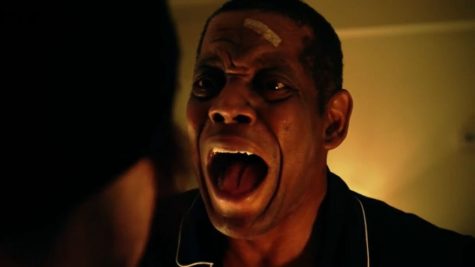
Synopsis: Before he can leave for his flight, someone steals Beau’s apartment keys. Therefore, he must stay at his apartment in order to prevent anyone from breaking in and hopefully retrieve his keys.
Whenever I try to list all seven of Aster’s short films, I always forget to list “Beau.” I’ve seen this multiple times, and I still don’t quite understand its story and what it’s trying to send off as a message. However, I did find this one to be creepy. “Beau” is only six minutes long but it somehow felt even quicker than that because I constantly wanted to know what was going to come next even though I tensed up while doing so. “Beau’s”camerawork works in favor to create this surreal lonely feeling that Beau feels as well, especially when accompanied by an eerie setting. Beau’s apartment is what I consider to be the saving grace of this movie. It feels cold and isolated, but the people that Beau does interact with are full of anger and hatred for no reason. Why are Beau’s neighbors so rude to him when he acts polite? Why did Beau’s keys get stolen? Why is there a hairy monster listening in on Beau’s phone calls? If you want to know the answer to any of these questions, “Beau” won’t give them to you. Even though this short film is probably my least favorite of Aster’s work, it has been rumored to be the main source of inspiration for “Disappointment Blvd.” with Joaquin Phoenix. If this is true, then I do look forward to seeing how “Beau” can transition into a full-length film with such an incredible actor. Hopefully this time “Beau” won’t be as ambiguous.
“Munchausen” (2013)
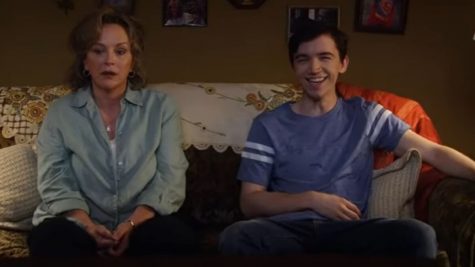
Synopsis: In a Pixar-Esque silent film, a boy packs for college but his mother, unwilling of letting him go, poisons him so that he stays.
Sixteen minutes seems like a tight limit for any filmmaker, but within that time, Aster beautifully showcases his camera knowledge and sense of emotion. Aster utilizes the camera and the score in a way that is reminiscent of “Up,” which is one of my personal favorite movies of all time. Capturing that same emotion from what people consider to be one of the saddest movies ever is no easy feat. The orchestral score goes so well with the montage of the boy’s faux college-life. At the start of “Munchausen,” the boy packs for college and leaves to be happy and successful. However, the parts of the movie that are depicting a happy story are just a dream. “Munchausen” quickly shifts its mood from happy to downright depressing. The mom ends up poisoning the boy so that he can’t leave, but it ends up killing him. What is most sad about this movie is that we are given a string of scenes that would have happened if he went to college, but we know that those occurrences are now impossible. That small bit of hope that gets crushed is what makes this movie horrifying. As a silent film, no actors can rely on line delivery. Therefore, they need to put an emphasis on their facial expressions and mannerisms, something that I feel many modern actors take for granted. In only 16 minutes with no dialogue, I felt more emotional watching “Munchausen” than any other full-length film as of late. This is the only short film from Aster’s filmography that I will explicitly recommend for everyone.
“C’est La Vie” (2016)

Synopsis: A drug-addicted homeless man gives a continuous monologue about life and society throughout different locations in Los Angeles.
“C’est La Vie” is my favorite short film from Aster. It’s simple: a homeless man goes on a rant about homelessness, life and society. Call me biased, but as someone that has lived in Los Angeles for my entire life, I enjoyed pinpointing all of the different locations that the homeless man rants in. A lot of homeless people in Los Angeles are exactly like this homeless man and I feel like Aster tried to simulate the same feeling of me trying to sit down on a bus bench while a homeless man rants to me about something that I don’t know anything about. What I appreciate most about this short film is that while this homeless man gives his monologue, a story is being told by the different scenes he is put in. For example, in one shot, the homeless man is holding out his thumb to hitchhike a ride. Next, he continues to give his monologue, but instead of looking at the camera, he looks at the driver. In the last shot, he is trying to bury the body of his driver while continuing to give his monologue. That is hilarious. The audience has no idea why he ended up killing the driver, but for whatever reason, we’re is still being told the aspects of homelessness in Los Angeles. Watching this initially, I was distracted by how well this homeless man was giving his George Carlin-like monologue that I didn’t notice how his location was stringing together to be put as one story. I found this to be extremely clever and I give Aster props for his creativity. Also to note, the actual monologue is given with so much emotion that I wouldn’t be surprised to see the actor in something bigger.
“Basically” (2014)
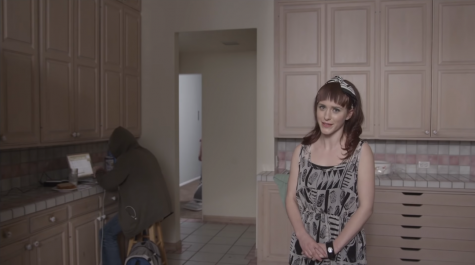
Synopsis: A wealthy starlet gives a continuous monologue about life and society throughout different locations in Los Angeles.
Basically, this short film is another “C’est La Vie” but with the audience being presented by a rich starlet socialite instead of a homeless man. I found it interesting how the woman in this film and the homeless man in “C’est La Vie” are complete opposites in social status but rant about similar things. Because of this, I like watching “C’est La Vie” and “Basically” back-to-back to compare the two short films with one another. After watching both of these after one another, it made me realize that in the end, no matter what our social status is, we all have our problems and we might even share them with someone that is completely different. Similar to “C’est La Vie,” Aster’s depiction of a pretentious person in the affluent suburbs of Los Angeles is so realistic to me as I know so many people from home that act and talk the way that this actress does. I love to hate this short because the accuracy of this pretentious person is too good that it annoys me when I get reminded of people from Los Angeles that I know in real life.
“The Turtle’s Head” (2014)
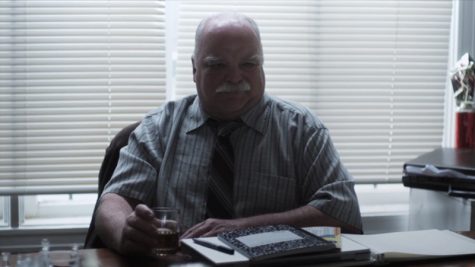
Synopsis: A perverted but humorous detective is in dismay as he realizes that his phallus is shrinking into his body.
I will admit, I find this short film hilarious. However, other people have viewed this short film as a body horror movie. Looking at this movie from a different perspective helped me see this short film as body horror, but it’s so overtly-filled with phallic jokes that I don’t think I could ever label this movie as such. This movie switches tones from a gritty detective movie at first to one big phallic joke. Having two separate tones is a definite obstacle as a director, but Aster was able to merge them well. I don’t think I would really consider this a horror movie, but it did make me laugh a lot. Unlike “TDF Really Works” which just presents you with phallic objects hoping that you will laugh, the jokes in “The Turtle’s Head” are well-thought-out and are reminiscent of Will Ferrell movies. I would say that I’d watch this short film with a group of friends to have a good round of laughs. “The Turtle’s Head” isn’t the best example of Aster’s work, but it is absolutely hilarious.
Email Aaron at [email protected] or follow him on Twitter @WhatTheFacundo.

